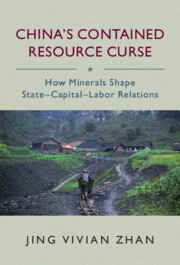Book contents
- China’s Contained Resource Curse
- China’s Contained Resource Curse
- Copyright page
- Dedication
- Contents
- Figures
- Tables
- Acknowledgments
- Abbreviations
- 1 Minerals and the State–Capital–Labor Triad
- 2 Minerals, Capital, and Local Economic Development
- 3 Resource Extraction and Victimization of Labor
- 4 Resources and Local State Capture
- 5 Resources and Local Public Goods Provision
- 6 Coping with the Resource Curse
- References
- Index
5 - Resources and Local Public Goods Provision
Published online by Cambridge University Press: 24 March 2022
- China’s Contained Resource Curse
- China’s Contained Resource Curse
- Copyright page
- Dedication
- Contents
- Figures
- Tables
- Acknowledgments
- Abbreviations
- 1 Minerals and the State–Capital–Labor Triad
- 2 Minerals, Capital, and Local Economic Development
- 3 Resource Extraction and Victimization of Labor
- 4 Resources and Local State Capture
- 5 Resources and Local Public Goods Provision
- 6 Coping with the Resource Curse
- References
- Index
Summary
Chapter 5 analyzes how mineral resources affect local provision of public goods. Through case studies and statistical analysis, it shows that local governments in resource-rich regions tend to spend less on human capital-developing public goods, including education and health care, due to the diminished demand for labor, the myopic decision-making of both citizens and officials, and the shedding of government responsibilities onto mining enterprises. On the other hand, wary of the tension between mining industries and local citizens and driven by the pressure to preserve social stability, the local governments in resource-rich regions spend more fiscal revenue on social security benefits for disadvantaged citizens. The redistribution of the resource wealth from resource capital to labor partially compensates for the latter’s welfare losses. Overall, while resource-rich regions have weak incentives to invest in human capital development, they do spend more on redistributive policies to redress popular grievance and ameliorate resource-triggered social conflicts.
Keywords
- Type
- Chapter
- Information
- China's Contained Resource CurseHow Minerals Shape State Capital Labor Relations, pp. 148 - 175Publisher: Cambridge University PressPrint publication year: 2022

